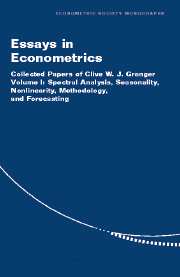Book contents
- Frontmatter
- Contents
- Acknowledgments
- List of Contributors
- Introduction
- 1 The ET Interview: Professor Clive Granger
- PART ONE SPECTRAL ANALYSIS
- 2 Spectral Analysis of New York Stock Market Prices
- 3 The Typical Spectral Shape of an Economic Variable
- PART TWO SEASONALITY
- PART THREE NONLINEARITY
- PART FOUR METHODOLOGY
- PART FIVE FORECASTING
- Index
2 - Spectral Analysis of New York Stock Market Prices
Published online by Cambridge University Press: 06 July 2010
- Frontmatter
- Contents
- Acknowledgments
- List of Contributors
- Introduction
- 1 The ET Interview: Professor Clive Granger
- PART ONE SPECTRAL ANALYSIS
- 2 Spectral Analysis of New York Stock Market Prices
- 3 The Typical Spectral Shape of an Economic Variable
- PART TWO SEASONALITY
- PART THREE NONLINEARITY
- PART FOUR METHODOLOGY
- PART FIVE FORECASTING
- Index
Summary
Summary
New York stock price series are analyzed by a new statistical technique. It is found that short-run movements of the series obey the simple random walk hypothesis proposed by earlier writers, but that the long-run components are of greater importance than suggested by this hypothesis. The seasonal variation and the “business-cycle” components are shown to be of little or no importance and a surprisingly small connection was found between the amount of stocks sold and the stock price series.
THE RANDOM WALK HYPOTHESIS
The stock market is an institution of considerable interest to the public at large and of real importance to students of a nation's economy. The variables which make up a stock market may not directly affect the mechanism of the economy but they certainly influence the psychological climate within which the economy works. To the extent to which the movements of the economy directly affect the stock market, a feedback situation occurs, although there are reasons to suspect that the strength of the feedback is not strong. The stock market produces large amounts of high quality data derived from well-understood variables. Despite these facts, the stock market has attracted surprisingly little study by professional economists or statisticians. It is interesting to note that Carl mengeR is reported to have made careful studies of the Vienna stock market before, in 1871, developing the concept of marginal utility and his theory of prices.
- Type
- Chapter
- Information
- Essays in EconometricsCollected Papers of Clive W. J. Granger, pp. 85 - 105Publisher: Cambridge University PressPrint publication year: 2001
- 1
- Cited by



